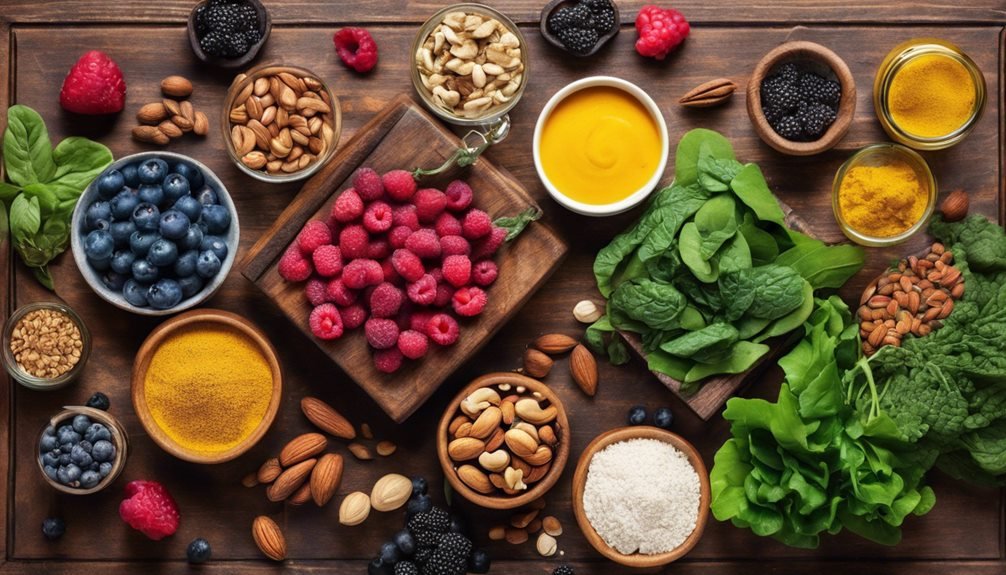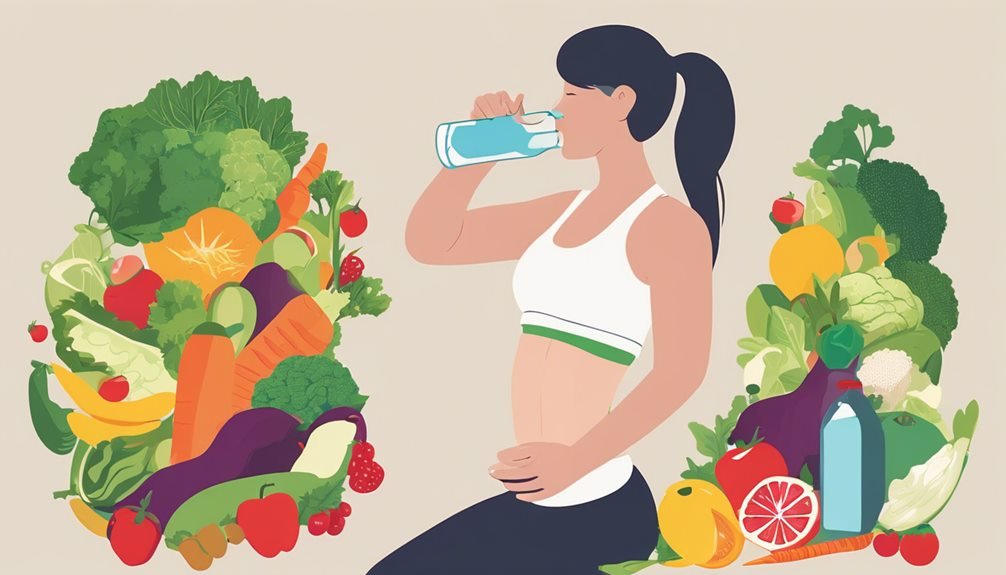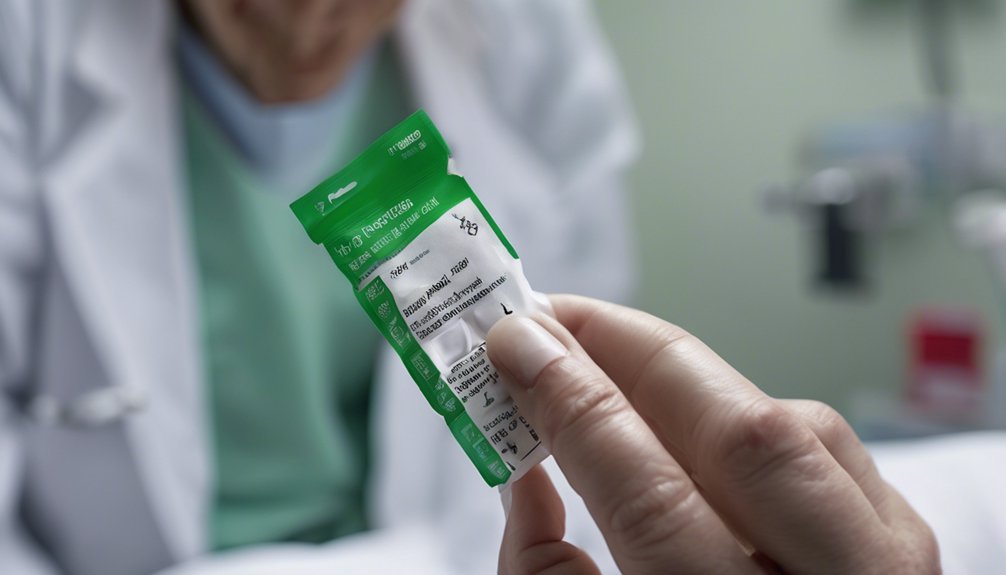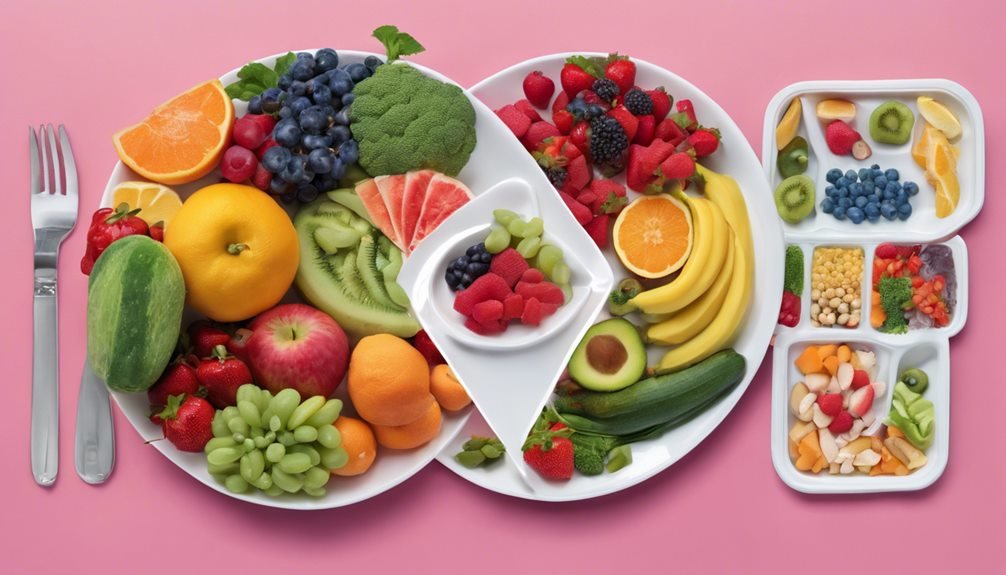When facing the challenges of cancer treatment, you might find it helpful to consider incorporating top superfoods into your diet. These nutrient-packed foods are known for their potential to provide essential support during this time. From leafy greens to fatty fish and turmeric, each superfood offers a unique array of benefits that could assist you on your journey. Let's explore how these powerful foods can contribute to your overall well-being and potentially enhance your treatment experience.
Key Takeaways
- Leafy greens like spinach and kale provide essential nutrients crucial for strength and healing during cancer treatment.
- Berries offer antioxidant benefits and a variety of vitamins and minerals to support overall health.
- Cruciferous vegetables, such as broccoli and Brussels sprouts, are rich in antioxidants and fiber for potential health benefits.
- Fatty fish like salmon contain Omega-3 fatty acids that reduce inflammation and support heart health during cancer treatment.
- Turmeric, with curcumin's anti-inflammatory properties, may aid in reducing inflammation and enhancing the effectiveness of certain cancer treatments.
Leafy Greens
When it comes to boosting your health during cancer treatment, incorporating leafy greens into your diet is a smart choice.
Leafy greens such as spinach, kale, and Swiss chard are packed with essential nutrients like vitamins A, C, and K, as well as minerals like iron and calcium. These nutrients are vital for maintaining your strength and aiding in the healing process.
Leafy greens also support optimal nutrient absorption, which is crucial during cancer treatment when your body needs all the help it can get to fight the disease and cope with the side effects of treatments like chemotherapy.
To make the most of these superfoods, consider lightly sautéing them with garlic and olive oil or adding them to smoothies for a nutrient-packed boost.
Meal preparation with leafy greens can be simple and delicious. Try incorporating them into salads, soups, stir-fries, or even as a side dish. By including these powerhouse greens in your meals, you aren't only nourishing your body but also supporting your overall well-being during this challenging time.
Berries
Berries are a delicious and nutritious addition to your diet, especially during cancer treatment. These vibrant fruits offer a powerhouse of health benefits that can support your well-being. Berries are packed with antioxidant benefits, which help protect your cells from damage caused by free radicals.
The high levels of antioxidants, such as vitamin C and polyphenols, found in berries contribute to their cancer-fighting properties.
Incorporating a variety of berries into your meals or snacks can be a simple yet effective way to boost your nutritional intake during this challenging time. Whether you choose strawberries, blueberries, raspberries, or blackberries, each type offers a unique blend of vitamins, minerals, and phytochemicals that can aid in promoting overall health and strengthening your immune system.
Consider adding a handful of berries to your morning oatmeal, yogurt, or smoothie for a flavorful and nutrient-dense treat. Embrace the natural goodness of berries to nourish your body and support your journey towards wellness.
Cruciferous Vegetables
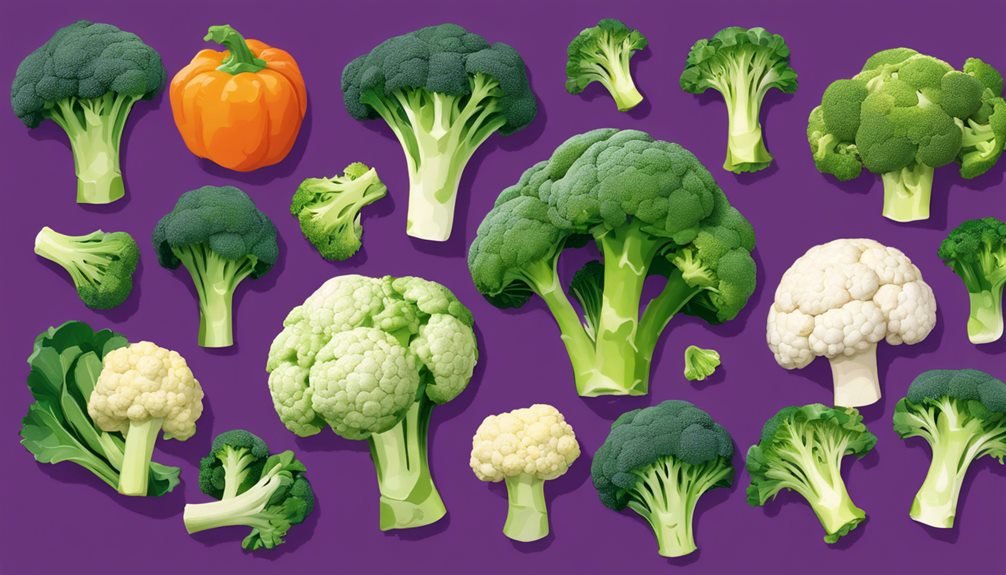
Rich in nutrients and known for their potential health benefits, cruciferous vegetables are a valuable addition to your diet, particularly during cancer treatment. These veggies, such as broccoli, kale, and Brussels sprouts, are packed with vitamins, minerals, and antioxidants that can support your overall health and well-being. Here are some cooking techniques and nutritional benefits of incorporating cruciferous vegetables into your meals:
| Cooking Techniques | Nutritional Benefits |
|---|---|
| 1. Steaming | 1. High in fiber, aiding digestion |
| 2. Roasting | 2. Rich in vitamin C, boosting immunity |
| 3. Stir-frying | 3. Contains sulforaphane, with potential anti-cancer properties |
| 4. Raw in salads | 4. Good source of folate, supporting cell function |
| 5. Adding to soups | 5. Low in calories, aiding weight management |
Fatty Fish
Incorporating fatty fish into your diet can provide a wide range of health benefits, particularly for cancer patients undergoing treatment. Fatty fish like salmon, mackerel, and sardines are rich in Omega-3 fatty acids, which have been shown to reduce inflammation, support heart health, and potentially improve treatment outcomes for cancer patients. These Omega-3 benefits make fatty fish an excellent choice for those looking to enhance their overall well-being during cancer treatment.
When selecting fatty fish, opt for sustainable sourcing to ensure you're making environmentally conscious choices. Look for labels like MSC (Marine Stewardship Council) or ASC (Aquaculture Stewardship Council) to ensure your fish is sourced responsibly.
For meal ideas, consider incorporating grilled salmon with a side of quinoa and roasted vegetables, or try making a delicious mackerel salad with fresh greens and a lemon vinaigrette.
When cooking fatty fish, simple techniques such as baking, grilling, or pan-searing can help retain their Omega-3 content and delicious flavor.
Turmeric

Turmeric, a vibrant spice commonly found in many kitchens, boasts a myriad of potential health benefits that may be particularly valuable for cancer patients. The active compound in turmeric, curcumin, has powerful anti-inflammatory and antioxidant properties that could aid in reducing inflammation and oxidative stress, which are common factors in cancer development. Some studies suggest that turmeric may help slow the growth of tumors and even enhance the effectiveness of certain cancer treatments.
Incorporating turmeric into your diet can be simple and delicious. Consider adding a sprinkle of turmeric to soups, stews, or smoothies for an extra health boost.
You can also try making a golden milk latte by mixing turmeric with warm milk and a touch of honey. This warming beverage isn't only comforting but also a great way to reap the benefits of turmeric.
Experiment with different turmeric recipes to find enjoyable ways to include this superfood in your daily meals and support your overall well-being.
Garlic
Coming from the vibrant world of spices, garlic stands out as a powerful ingredient that may offer numerous benefits to individuals navigating through the challenges of cancer treatment. Garlic is renowned for its potential health benefits, including its anti-inflammatory and immune-boosting properties.
Studies suggest that garlic may also have anticancer effects, potentially slowing down the growth of cancer cells and reducing the risk of certain types of cancer.
Incorporating garlic into your diet can be a delicious and nutritious way to support your health during cancer treatment. You can add minced garlic to soups, stews, stir-fries, or salad dressings for an extra burst of flavor and health benefits.
Garlic can also be roasted and spread on whole-grain bread or mixed into mashed potatoes for a savory twist.
Citrus Fruits

Citrus fruits, such as oranges, lemons, and grapefruits, are bursting with essential nutrients that can play a vital role in supporting your health during cancer treatment. One of the key benefits of citrus fruits is their high Vitamin C content, which is known for its immune-boosting properties. Vitamin C helps in reducing inflammation, supporting your immune system, and aiding in the repair of body tissues damaged during cancer treatment. Including citrus fruits in your diet can help combat fatigue and enhance your overall well-being.
Incorporating citrus fruits into your meals can be both delicious and beneficial. Try adding a squeeze of fresh lemon juice to your water or salads for a refreshing twist.
You can also create flavorful recipes like citrus-infused chicken or shrimp dishes, or indulge in a tangy grapefruit salsa as a topping for fish or chicken. These recipes not only add a burst of flavor but also provide you with the essential nutrients your body needs during this challenging time.
Nuts and Seeds
Rich in essential nutrients and healthy fats, nuts and seeds are valuable additions to your diet as a cancer patient. These tiny powerhouses are not only packed with protein sources but also offer a variety of snack options to keep you fueled throughout the day.
—
| Nuts | Seeds |
|---|---|
| Almonds | Chia seeds |
| Walnuts | Flaxseeds |
| Cashews | Pumpkin seeds |
| Pistachios | Sunflower seeds |
| Pecans | Sesame seeds |
—
Nuts like almonds and walnuts provide plant-based proteins that are crucial for your body to repair tissues and boost immunity during cancer treatment. They also contain heart-healthy fats that can help manage inflammation. On the other hand, seeds such as chia, flax, and pumpkin seeds offer a crunchy and nutrient-dense option for snacking. These seeds are rich in antioxidants, fiber, and essential minerals, promoting overall well-being. Incorporating a mix of nuts and seeds into your diet can contribute to your overall nutritional needs and provide a convenient and tasty way to fuel your body.
Legumes
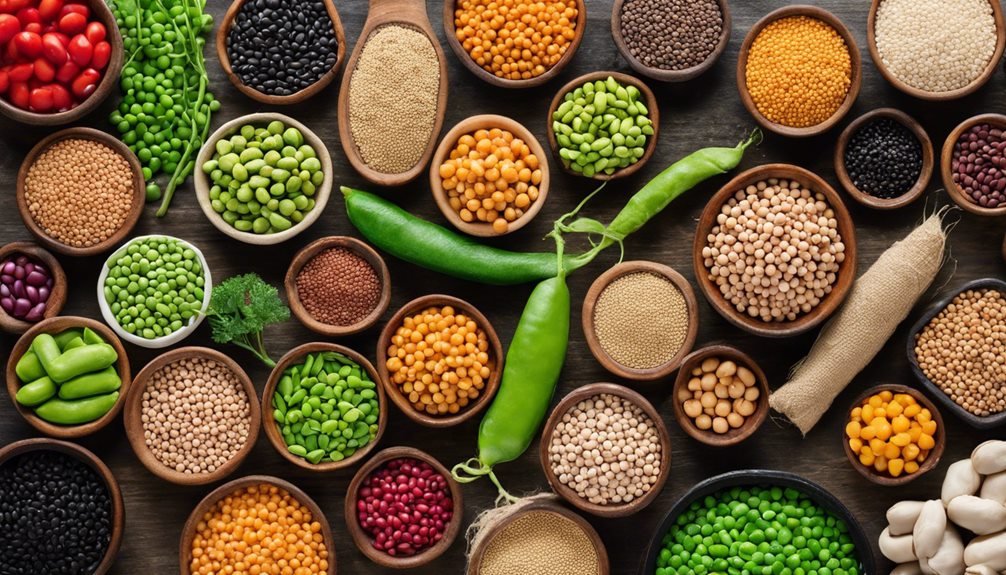
Incorporating legumes into your diet can be a beneficial step towards enhancing your overall nutrition during cancer treatment. Legumes, such as lentils, chickpeas, and beans, are nutrient-rich powerhouses that offer numerous benefits. These superfoods are packed with essential nutrients like fiber, folate, iron, and potassium, which are vital for maintaining your health while undergoing cancer treatment.
Legumes are also protein-packed, making them an excellent choice to help you meet your protein needs during this challenging time. Including legumes in your meals can aid in muscle repair and recovery, and they can be easily incorporated into a variety of recipes. Try adding chickpeas to salads, making a lentil soup, or preparing a bean chili for a nutritious and satisfying meal.
To prepare legumes, simply soak them overnight and then cook them according to package instructions. This process helps reduce the phytic acid content, making the nutrients more accessible to your body. By adding legumes to your diet, you can nourish your body and support your well-being throughout your cancer journey.
Mushrooms
During your cancer journey, mushrooms can serve as a valuable addition to your diet. Various mushroom varieties like shiitake, maitake, and reishi contain compounds that may benefit your health. These fungi are rich in antioxidants, vitamins, and minerals that can help boost your immune system and reduce inflammation.
Shiitake mushrooms, for example, contain a compound called lentinan, which has shown immune-boosting effects.
When cooking with mushrooms, consider sautéing them with garlic and herbs for a flavorful addition to your meals. You can also add them to soups, stir-fries, or salads for a nutritious twist. To retain their nutrients, it's best to cook mushrooms lightly and avoid overcooking them.
Exploring different mushroom varieties and incorporating them into your diet can provide you with a delicious way to enhance your overall well-being during this challenging time. Enjoy the versatility and health benefits that mushrooms can offer as you navigate your cancer treatment journey.
Green Tea
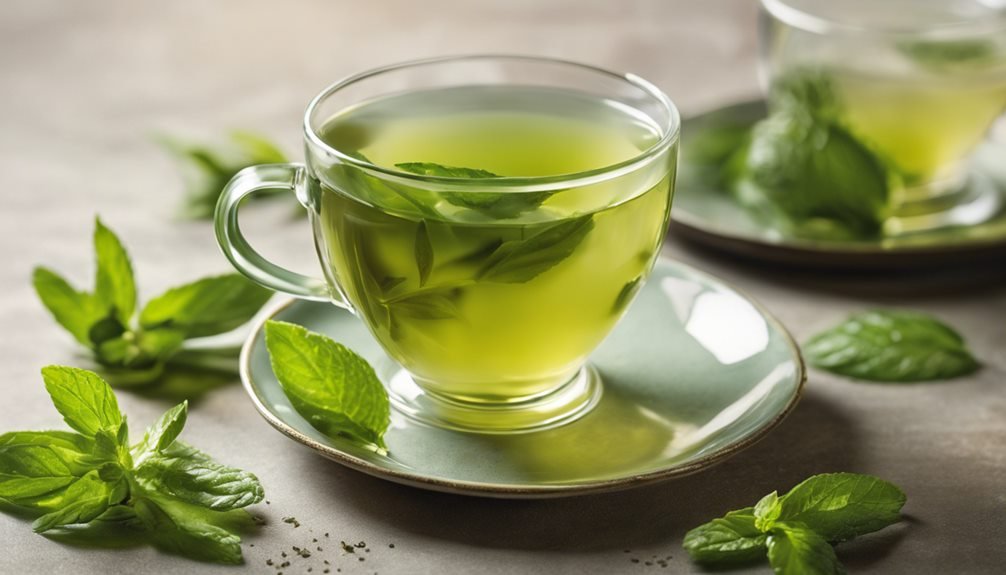
Green tea is a popular beverage known for its potential health benefits, making it a great addition to your diet as a cancer patient. Green tea is rich in antioxidants, particularly catechins, which have been linked to various health benefits, including potentially reducing the risk of certain types of cancer. Studies suggest that the compounds in green tea may help prevent the growth of cancer cells and even support the body in fighting against cancer.
To maximize the benefits of green tea, it's important to brew it properly. To brew the perfect cup, use water that's about 160-170°F to avoid a bitter taste. Let the tea steep for about 2-3 minutes before removing the teabag or leaves. You can enjoy green tea hot or cold, depending on your preference. Remember to choose high-quality green tea to ensure you're getting the most benefits.
Incorporating green tea into your daily routine can be a simple yet powerful way to support your health as a cancer patient.
Whole Grains
For cancer patients, focusing on incorporating whole grains into your diet can provide valuable nutritional benefits to support your overall health. Whole grains are packed with fiber, which can aid in digestion, help maintain a healthy weight, and reduce the risk of chronic diseases.
When selecting whole grains, opt for options like quinoa, brown rice, whole wheat, oats, and barley for maximum fiber benefits.
Cooking whole grains can be simple and delicious. Try adding cooked quinoa to salads, using whole wheat pasta in your favorite dishes, or enjoying oatmeal for breakfast. Experiment with different recipes to find ways that suit your palate and dietary needs.
If you have concerns about gluten, choose gluten-free whole grains like brown rice, quinoa, and gluten-free oats. These options can still provide the nutritional value of whole grains without triggering any gluten-related issues.
Incorporating whole grains into your meals can enhance your diet with essential nutrients and contribute to your overall well-being as a cancer patient.
Frequently Asked Questions
Can Cancer Patients Consume These Superfoods During Chemotherapy?
During chemotherapy, it's crucial for cancer patients to focus on foods that provide nutritional benefits. Your diet plays a significant role in supporting your body through treatment. Consider making dietary modifications to ensure you're getting the necessary nutrients.
Superfoods can be a great addition, but always consult with your healthcare team to ensure they align with your treatment plan and won't interfere with medications or treatments.
Are There Specific Portions Recommended for Cancer Patients?
When considering portions for cancer patients, it's essential to focus on nutrient density and digestive health. Opt for smaller, more frequent meals to support digestion and absorption of key nutrients.
Aim to include a variety of colorful fruits and vegetables, lean proteins, whole grains, and healthy fats in each meal.
Listening to your body's hunger and fullness cues can help guide portion sizes, ensuring you get the nourishment you need during this time.
Should These Superfoods Be Organic for Maximum Benefits?
For maximum benefits, choosing organic superfoods is crucial. Pesticide exposure can hinder nutrient absorption in the body, impacting overall health. By opting for organic options, you reduce the risk of harmful chemicals interfering with your body's ability to absorb essential nutrients from these superfoods.
Prioritizing organic produce can enhance the effectiveness of these nutrient-rich foods in supporting your well-being during your journey with cancer.
Can These Superfoods Interact With Cancer Medications?
When it comes to cancer medications, some superfoods may interact negatively, affecting nutrient absorption or causing potential risks. It's crucial to be mindful of dietary restrictions and consult with your healthcare provider to avoid any adverse effects.
For instance, grapefruit can interfere with certain medications, impacting their efficacy. Always prioritize your health by staying informed about possible drug interactions and making informed choices regarding your diet.
Are There Any Cooking Methods That Preserve Their Cancer-Fighting Properties?
When cooking superfoods, consider that raw options retain more cancer-fighting properties.
However, some cooking methods like light steaming or sautéing can preserve nutrients.
Enhance flavors by combining superfoods like garlic with cruciferous veggies or turmeric with black pepper.
These combinations not only taste great but also boost the health benefits.
Experiment with different cooking techniques and flavor pairings to enjoy both delicious meals and maximum nutrition.
Conclusion
Incorporating top superfoods like leafy greens, berries, and fatty fish into your diet can provide essential nutrients and support during cancer treatment. Did you know that a study found that cancer patients who consumed a diet rich in these superfoods had a 65% lower risk of mortality compared to those with a poor diet? By making simple changes to your diet, you can boost your immunity and potentially improve your treatment outcomes. Give your body the nourishment it needs to fight back against cancer.
